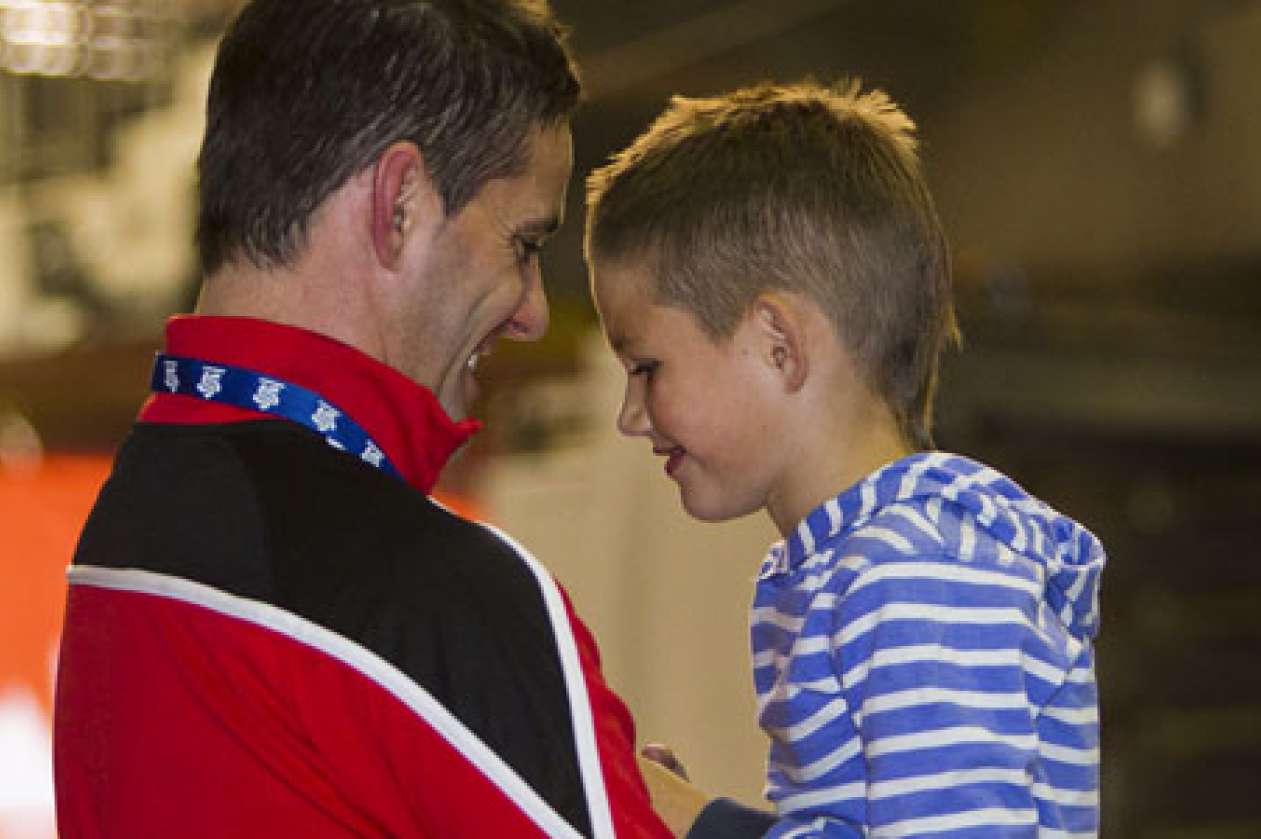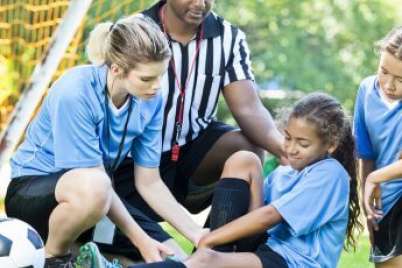
John Herdman: Our kids need Play Angels
As coach of Canada’s women’s national soccer team, John Herdman (pictured above with his son, photo courtesy of Canada Soccer) is always looking for the next generation of talented players.
The team won the bronze medal at the London Olympic Games in 2012, but he needs to reinforce and renovate the squad so they continue to excel in international competition. That means he and his scouts have to keep their eyes open for skilled youngsters.
And Herdman is concerned. Quite simply, he’s just not finding the gems. He subscribes to a growing theory as to why there appears to be such a sparse pool of “talented” young players.
The theory goes like this: As unstructured free play steadily disappears in affluent countries such as Canada, our kids are not developing the movement skills and basic decision-making abilities that experts believe are developed during unstructured play.
The constant adult “coaching” that is part of structured play settings actually contributes to the problem.
Does Herdman have any suggestions on what can be done? You bet. I spoke with him in the spring of 2013 to talk about his dream of a new grassroots movement of volunteer “play angels” who can promote free play for kids.
Q. Why are you so enthusiastic about promoting “free play” for kids?
What I’ve observed about sport in the last 20 years is that it has become too structured and too organized. It’s happened because access to facilities has become more difficult, and there aren’t as many open green spaces left as there were back in the day.
We now also have this protective paranoia of the parent. We watch the news and we know exactly how this society can damage kids. I think that protective paranoia has meant that everything is now organized, and there’s no longer that opportunity for children to just explore creative play.
I think if we want to start developing great Canadian athletes, we have to build a culture of play opportunities that support real creative decision making, which is built without the guidance of the coach or the parent. Where kids are allowed to learn naturally through their play.
Q. These are interesting views considering that you are a high-level coach with the job of winning medals and trophies. How does kids’ free play help you?
Great players are born out of unorganized, informal play. The accumulation of hours in informal play are more important or just as important between the ages of 6 and 12 because that’s where you develop your real love for sport. I don’t think it happens in the club environments.
When you look back at the success literature of players who became great athletes, many of them weren’t coached until their teens and late teens. So I think there’s an opportunity to get more kids more active more often by promoting unstructured free play, and it’s also an opportunity to develop skilled athletes who are also great decision makers.
Particularly in soccer, free play helps to develop players who have more natural knowledge. It’s not knowledge that has been poured into them by a coach. It’s their own practical knowledge that they have developed through experience, and through trial and error.
That includes experiences like playing against big kids because the big kids turned up, so I have to play against big kids tonight. Or tonight I have to play on a smaller field area, in a game I’ve never played before.
I have to figure that out, and I might even transfer what I learn to another favourite sport.
Q. What is your concept behind “play angels” and how would it help?
The idea is that play angels would be adults who offer their time to supervise kids in their neighbourhood in unstructured play. We need those moms and dads and uncles and aunts who are prepared to help these kids and provide safe opportunities.
I’m talking about bringing back the days when we used to feel safe going out on the street and playing with our friends. We weren’t afraid of being kidnapped or being bothered by drug addicts. I’m talking about parents just letting the kids play, where they don’t whoop and cheer. Just a place where the kids can feel safe and comfortable to explore.
The play angel’s responsibility would be to help provide those opportunities where imagination can flow, and enjoyment can flow, and kids can learn lessons about winning and losing without a parent worrying about it.
I’ve started doing this already by giving up 30 or 40 minutes each week to go and play with my son and his friends in our local park. I might have other things going on, but I make sure that once a week I turn up at this park, at this time, and kids can turn up and they can play soccer. I keep an eye on them, and parents can come and collect them after 45 minutes.
Q. How do you get the word out, and what kind of response are you getting?
I’m just sending out an email and saying to the kids that we’re going to meet at a certain place at a certain time, and I’ll organize a soccer game, and any kids that want to hang around are welcome. But I’m not talking about this being a structured thing.
I’m just committing a few hours each week to doing it with the kids. I get this little group out on the grass when I’m back home. In the winter, I take them into a little school gym. And it’s so easy to do.
You think about all the barriers that people create in kids’ sports. “We don’t have enough facilities” or time on the turf, so the kids can only practice soccer once per week.
I don’t agree with that. I’ll see anyone who wants to come at 10 o’clock to the park, and they all turn up. Just a local piece of grass in a local park. And you say, “Right, here we go kids!”
Q. What do you do for equipment?
What do you need? You just need two jackets at one end, and two at the other end, and those are your goals. And the kids say, “But where’s the field? Where do we mark the cones out?” Well, we haven’t got any cones. The pitch is the pitch – just play! [Laughs] And the kids just play.
Q. What about concerns parents might have for the safety of their child going to play under the supervision of a Play Angel whom they don’t know personally?
For parents, if you’re going to send your kid along, make sure it’s an open space. Make sure there are toilets nearby so they can go to the toilet. Make sure you hang around and be part of the play angel experience. Take a picnic basket and sit and watch.
And just enjoy the experience. You don’t need to whoop and cheer when a goal is scored. Just let your kid play and watch from a distance. Your only job as a parent is to make sure that your kids are safe. Nothing else.
Q. What about when the weather is bad? And how do you keep it going through different seasons?
In the winter, you go to your local school, and you find out no one is using the gym in the evenings, so you ask about using it. And they say, well you have to stay at least 45 minutes, and you have to pay the rental. And you say, yeah-yeah, how much is that going to cost?
Eleven dollars. And you say alright kids, everyone bring a dollar, and everyone contribute a dollar, and we can pay for the gym. And I imagine in some areas you’ve got play angels who could easily afford to pay this cost on their own. They can commit that eleven dollars to help some kids play.
Q. How might we promote a Play Angel movement? How do we get people talking and moving on this idea?
I think the biggest opportunity is probably through Twitter and Facebook. We create a movement through non-traditional methods, and almost create a “cult” of play angels [laughs.] I think those types of grassroots movements become stronger, because they don’t rely on media. They rely on people. And the movement just takes hold of the country.
There might also be a chance for corporate partnerships to drive this forward, but as soon as partnerships become involved, there’s an element that you lose. You risk losing the essence of what we’re trying to create, which is just to get mom or dad off the couch and help the kids to experience safe unstructured free play.
Q. What words of encouragement can you offer to would-be Play Angels?
It’s one of the biggest things we can do. As a play angel, you make a lifetime difference. I think as a parent or anyone who decides to go out and help the kids, those 45 minutes each week are one of the best investments you can ever make.






Couldn’t agree more. My best childhood memories are as he describes. Two jackets or sweaters for goals, and away you go. Rene Meulensteen, former Assistant Coach at Manchester United, described how their youngest players play 4 on 4, with parents at least 25 yards away. This just lets the kids discover how to play, what space is, try some tricks without worrying about giving up the winning goal, etc.
What would happen if The Coaching Association of Canada mandated that every sport teach their coaches to be play angels through their NCCP training? Why isn’t their unstructured play and fun in every sport for all ages?
He needs to talk to Sutter! They are on the same wave lengths and people in the coaching as well as the parental arena need to start taking notes.
I am working in North Carolina on active play and FMS/Movement Concepts development through caregiver and parental education. The biggest thing I see is this ‘structured’ physical activity philosophy stretching into the younger years. I think that sport specificity at too young of an age can also be harmful to developing the overall athlete at the highest level.
Thanks for the read!
Interesting article. It is a nice idea and good for those parents who are scared to let their kids play on their own. We have a couple of groups of kids who are allowed to play on their own in the traditional way – just tell Mom where you are going, stay within certain street boundaries, etc.
I plan on letting my son play normally as well.